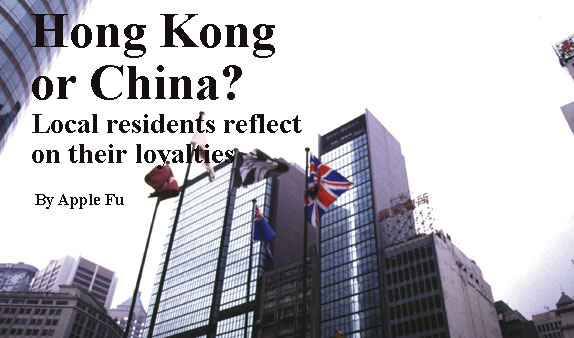




T he question of national identity confuses a lot of Hong Kong people, especially with 1997 just around the proverbial corner. Meantime, many are hastening to get passports before the deadline.
Mr. Chan Kwok Wai, 25, a Mainland-born fireman, claims to be a Hongkonger because, even though he was born in China, Hong Kong is the place where he grew up.
Mr. Chan said he migrated to Hong Kong 18 years ago because he was eager to be reunited with his father.
“I have many friends and acquaintances here, while I know nobody in China,” said he.
He added that he has no contact with relatives in China. He said the memory of his village has faded.
“I left my home at 7. Now I can hardly remember how it looked,” said he.
Visiting mainland China two years ago was an unpleasant and disgusting experience for him.
“People were impolite. They jumped the queues and quarrelled with one another on the street. Furthermore, spitting was a common practice for almost every Mainlander,” he said.
He added that he spotted a man paying a bribe to a Public Security Bureau officer to avoid being charged for something. He said he was lucky to be a Hong Kong resident, because it has a good a legal tradition.
“It is also honourable to be a Hongkonger because the name Hong Kong implies good reputation, opportunity, prospects and success,” said he.
To Guangzhou-born Sharon Lam, time will not change her identity. She arrived at the Territory in 1982 with her mother.
“It was so poor and desperate to start out. I always hoped that time would pass quickly,” said Miss Lam.
She said the Chinese government’s intervention in the democratic movements in both China and Taiwan affected her views of the Communist government.
She is strongly against the use of violence to resolve political struggles.
“I really sympathized with the Chinese patriotic pro-democracy movement in 1989,” she of the Tiananmen incident.
“But we have to draw a line between the government and the nation. It was the government’s mistake to suppress the democratic demonstration in 1989. We are people of the nation, rather than the government,” said she.
“Though I am far away, my concerns are near to my homeland,” said she.
She said that she cared about the lives of people in the Mainland, especially victims of floods and droughts.
She regrets the division of ethnic Chinese identities into Mainlanders, Taiwanese, and Hongkongers.
“They (people who believe in this division) are so narrow-minded that they deny any relationships and links with their Chinese counterparts,” said she.
Even though her parents have not taught her explicitly to love China, she knows something about the politics and culture of her motherland.
Miss Lam’s father sometimes talks about the history of China — for example, about the civil war and the Cultural Revolution.
She said lessons in school on China, like lessons on festivals and on ethnic minority groups, made her understand her national identity and further reinforced her appreciation of China.
“It is our responsibility to teach the next generation about their national orientation and sense of belonging to China,” said she.
Leung Pak (not his real name), a 77-year-old villager in Rennie’s Mill, said his political background did not negatively affect his national identity.
Rennie’s Mill is the place where Kuomingtang nationalists settled 45 years ago, after their defeat by the Communists.
Leung Pak was one of the followers of Kuomingtang during the 10-year civil war, so he was forced to leave China.
Leung Pak declined to express his views about recent political moves of the Chinese Communist Party, nor did he have anything to say about the Chinese military manoeuvres during the March Taiwanese presidential election.
“Democracy is taboo to the Chinese government, and we cannot say or do anything to anger the government,” he said circumspectly.
He said his national identity was determined by his blood, and he has no choice but to accept it. Mr. Cheung Ka Fai is a 36-year-old Chinese immigrant. He said he is Chinese and he has high expectations for China.
“I hope that it will be stronger, both in terms of economic and military power,” said he.
He suspects the motives of people holding foreign passports. They are not loyal to their nation, he said. “They lack confidence, while they want to secure their interests in the Territory after the change of sovereignty,” he said critically.
Mr. Cheung’s son, a Primary 1 student, was born in Hong Kong. Mr. Cheung said his son has to be taught to love China.
“I will tell him that he is a Chinese and should respect his country,” said he.
He said that it was important to enhance the sense of belonging to China, since children can be easily influenced by others and establish an incorrect national identity.
“Those who were brought up in foreign countries fail to identify themselves as Chinese because they lack family guidance,” said he.
He suggested that parents should show appreciation of Chinese values and culture.
However, the question of national identity still puzzles Mr. Cheung’s 18-year-old brother, Ka Ming.
He said he could not decide whether he is a Chinese or a Hongkonger, as he was born in Hong Kong, but his ancestors were from the Mainland.

